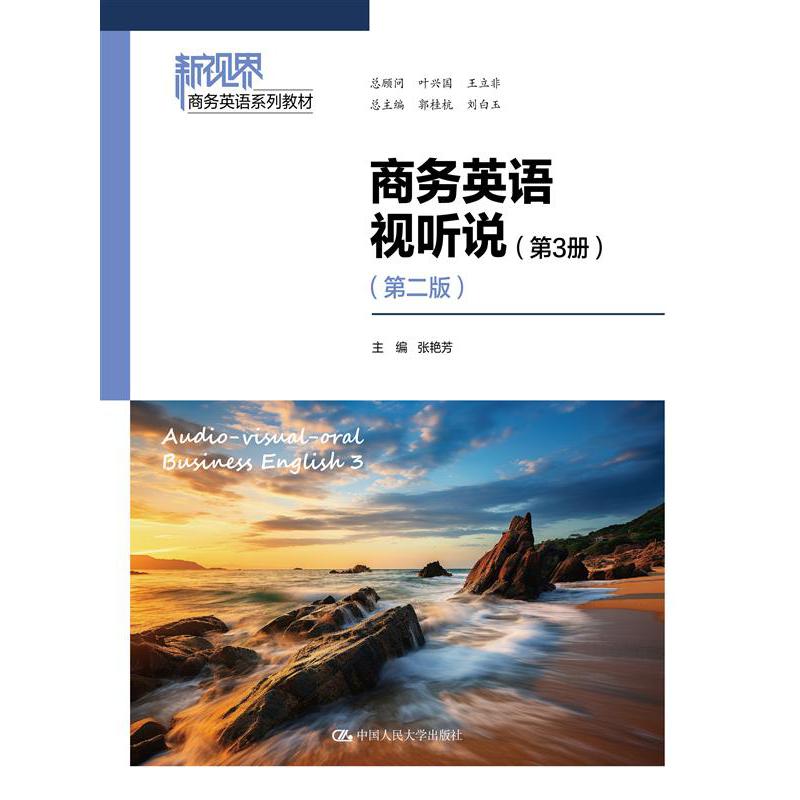
出版社: 中国人民大学
原售价: 45.00
折扣价: 31.50
折扣购买: 商务英语视听说(第3册)(第二版)(新视界商务英语系列教材)
ISBN: 9787300321165

张艳芳,副教授;博士,2017赴加拿大短期访学交流;曾任山东英才学院外国语学院院长;现就职于山东政法学院外国语学院,同时,兼任山东省对外经济学会国际商务英语专业委员会常务理事,菲律宾泛太平洋大学研究生院博士论文答辩委员会委员。在国际、国内期刊发表论文累计近20余篇;主持山东省社会科学规划课题1项,厅级课题1项,参与省级以上课题多项;主编教材5部;副主编、参编其他教材3部。
Unit 1 International Organizations
Part I Lead-in
1. Watch the following video clip and answer the questions.
World Trade Organization
Words and Expressions
(1) bulk /bʌlk/ n. the main part of sth.; most of sth. 主体;大部分 (TEM-8, CET-4)
(2) ratify /'rætɪfaɪ/ v. to make an agreement officially valid by voting for or signing it 正式批准;使正式生效 (CET-6)
(3) parliament /'pɑːləmənt/ n. the group of people who are elected to make and change the laws of a country 议会;国会 (TEM-4, CET-4)
(4) tariff /'tærɪf/ n. a tax that a government collects on goods coming into a country(政府对进口货物征收的)关税 (TEM-4, CET-6)
Notes
(1) GATT (General Agreement on Tariffs and Trade): The General Agreement on Tariffs and Trade (GATT) is a legal agreement between many countries, whose overall purpose was to promote international trade by reducing or eliminating trade barriers such as tariffs or quotas. According to its preamble, its purpose was the “substantial reduction of tariffs and other trade barriers and the elimination of preferences, on a reciprocal and mutually advantageous basis.” It was signed by 23 nations in Geneva on October 30, 1947, and was applied on a provisional basis on January 1, 1948. The WTO is the successor to the GATT. 关税及贸易总协定是一个政府间缔结的有关关税和贸易规则的多边国际协定,简称关贸总协定。它的宗旨是通过削减关税和其他贸易壁垒,消除国际贸易中的差别待遇,促进国际贸易自由,以充分利用世界资源,扩大商品的生产与流通。关贸总协定于 1947 年 10 月 30 日在日内瓦签订,并于 1948 年 1 月 1 日开始临时适用。关贸总协定是世界贸易组织(WTO)的前身。
Questions
(1) What is WTO?
(2) What is the function of WTO?
(3) What do you think of WTO?
2. Read the following passage and discuss the questions.
The Shanghai Cooperation Organization
The Shanghai Cooperation Organization (SCO) is a permanent intergovernmental international organization, the creation of which was announced on June 15, 2001 in Shanghai (China) by the Republic of Kazakhstan, the People’s Republic of China, the Kyrgyz Republic, the Russian Federation, the Republic of Tajikistan, and the Republic of Uzbekistan. It was preceded by the Shanghai Five mechanism.
The Shanghai Cooperation Organization Charter was signed during the St. Petersburg SCO Heads of State meeting in June 2002, and entered into force on September 19, 2003. This is the fundamental statutory document which outlines the organization’s goals and principles, as well as its structure and core activities.
The historical meeting of the Heads of State Council of the Shanghai Cooperation Organization was held on 8–9 June, 2017 in Astana. On the meeting the status of a full member of the Organization was granted to the Republic of India and the Islamic Republic of Pakistan.
The SCO’s main goals are as follows: strengthening mutual trust and neighborliness among the member states; promoting their effective cooperation in politics, trade, the economy, research, technology and culture, as well as in education, energy, transport, tourism, environmental protection, and other areas; making joint efforts to maintain and ensure peace, security and stability in the region; and moving towards the establishment of a democratic, fair and rational new international political and economic order.Proceeding from the Shanghai Spirit, the SCO pursues its internal policy based on the principles of mutual trust, mutual benefit, equality, mutual consultations, respect for cultural diversity, and a desire for common development, while its external policy is conducted in accordance with the principles of non-alignment, non-targeting any third country, and openness. The Heads of State Council (HSC) is the supreme decision-making body in the SCO. It meets once a year and adopts decisions and guidelines on all important matters of the organization. The SCO Heads of Government Council (HGC) meets once a year to discuss the organization’s multilateral cooperation strategy and priority areas, to resolve current important economic and other cooperation issues, and also to approve the organization’s annual budget. The SCO’s official languages are Russian and Chinese.